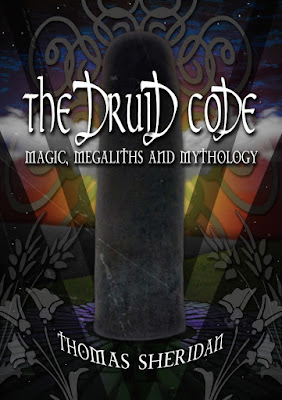Review: The Druid Code: Magic, Megaliths and Mythology by Thomas Sheridan.

In Thomas Sheridan's extensive study of Irish mythology and history the reader gets a perspective which combines both a folkloric and symbolic framework. This is an often overlooked type of examination when it comes to Irish history but one which is most valuable to the unbiased thinker. In many instances accurate exploration and indeed interpretation of Irish megaliths has been forced to fit a worldview which sees Christianity as the most logical and enlightened conclusion. While many Irish archaeologists and historians of the twentieth century had a reflexively Biblical starting position this is no longer an excuse for academics today who have extensive documents, comparative religious sources and archaeo-astronomical evidence at their disposal. Depressingly, Sheridan demonstrates that even with this potential for new appraisal, up until recently Irish archaeology has still been reluctant to accept and embrace the true scope of its pagan past. Rather than succumbing t...


